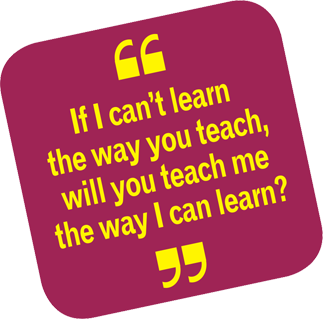Assessment
Diagnostic Tests for Specific Learning Disability
In India, different professionals use different battery of tests for diagnosis, the most common one being the Woodcock Johnson III - Tests of Achievement. Indian adaptations of the Wechsler Intelligence Scale for Children (WISC) III, WISC - IV India Edition and Binet-Kamat Test of Intelligence are the commonly used Intelligence Tests.
Standard Assessment Battery used at MDA
Depending on the age at the time of assessment, a battery of the following tests is used, ensuring that all the relevant areas are evaluated to arrive at a diagnosis.
- Wechsler Intelligence Scale for Children – Fourth Edition (Indian Adaptation) (WISC-IV) (6 years to 16 years 11 months) (Verbal Comprehension, Perceptual Reasoning, Working Memory, Processing Speed)
- Wechsler Intelligence Scale for Children (Indian Adaptation by Dr Mahendrika Bhatt) (5 years to 15 years 11 months) (Verbal IQ, Performance IQ)
- Binet-Kamat Test of Intelligence (Mental Age 3 years to 23 years)
- Wechsler Adult Intelligence Scale – Fourth Edition (India) (WAIS-IV)
- Bender Visual Motor Gestalt Test (BG) (Perceptual Age: 5 years to 10 years 11 months)
- Ann Arbor Learning Inventory (5 years to 14 years 11 months) (visual processing, auditory processing and visual-motor co-ordination skills)
- Comprehensive Test of Phonological Processing – Second Edition (CTOPP-2) (4 years to 24 years)
- Gray Oral Reading Tests – Fifth Edition (GORT-5) (6 years to 23 years 11 months)
- Word Identification and Spelling Test (WIST) (7 years to 18 years)
- Test of Written Language – Third Edition (TOWL-3) (7 years to 17 years 11 months) (spontaneous writing skills, vocabulary, spelling, style, logical sentences, sentence combining)
- Test of Written Language – Fourth Edition (TOWL-4) (9 years to 17 years 11 months) (spontaneous writing skills, vocabulary, spelling, punctuation, logical sentences, sentence combining)
- Wide Range Achievement Test - Expanded (WRAT-Expanded) (5 years to 24 years 11 months) (reading comprehension)
- Wide Range Achievement Test - 3 (WRAT3) (5 years to 74 years 11 months) (reading, spelling)
- Woodcock Johnson III - Tests of Achievement (writing fluency, math fluency, calculation, applied problems, quantitative reasoning)
- Woodcock Johnson III - Tests of Cognitive Abilities (short-term memory, cognitive fluency, processing speed, working memory)
Assessment Battery as per the Educational Testing Services guidelines for accommodations at the IGCSE, IB, SAT, LSAT, GMAT, GRE, IELTS, TOEFL examinations and for accommodations in international colleges/universities
- Wechsler Intelligence Scale for Children – Fourth Edition (Indian Adaptation)
- Wechsler Adult Intelligence Scale – Fourth Edition (India) (WAIS-IV)
- Woodcock Johnson III - Tests of Cognitive Abilities
- Woodcock Johnson III - Tests of Achievement
- Test of Written Language – Fourth Edition (TOWL-4)
- Nelson-Denny Reading Test
Unfortunately, the assessment process in Mumbai is over-stretched and there may be a long waiting list. We appreciate that this can be very frustrating, but there is really nothing to replace a professional one-on-one assessment by a trained Dyslexia professional in order to get a full and accurate picture of the nature of your child’s Dyslexia.
Certificate of Disability/Diagnostic Report
To avail of the accommodations, students need to submit the Certificate of Disability or a diagnostic report, depending on the State and the Board conducting the examinations.
Maharashtra State – The State Board recognizes certification from the LD Clinics of the 3 Hospitals in Mumbai – Lokmanya Tilak Municipal General Hospital, B.Y.L. Nair Hospital and KEM Hospital. Certificate from Sassoon Hospital, Pune, is also accepted.
Karnataka State - Candidates need to be certified from one of the following: National Institute of Mental Health and Neuro Sciences (NIMHANS), Bangalore; St John’s Hospital, Bangalore; All-India Institute of Speech and Hearing, Mysore; any psychiatrist working in a government hospital; any clinical psychologist with an M.Phil. and attested by a government doctor (not below the rank of a district surgeon), Malleswaram Dyslexia Association.
Tamil Nadu State - Psychiatrists from Government Hospitals can certify based on the assessment by a Clinical Psychologist as per the Tamil Nadu Government Order No. 47 Sl No. 1, issued on February 18, 1999.
Kerala State - Certificate from a psychiatrist – above rank of Asst. surgeon in any Govt. Hospital countersigned by the DEO or a Registered Clinical Psychologist.
State of Andhra Pradesh – Child Psychiatry Department, Niloufer Hospital, Hyderabad.
Council For The Indian School Certificate Examinations - Recommendation sent by the Head of the School and on provision of the necessary documents and detailed diagnostic report by a competent authority approved by the State/Central Government and acceptable to the Council.
Central Board of Secondary Education - Certificate from a Municipal or Government Hospital.
Remedial
- One-on-one remediation with Special Educators, 2-4 times a week
- Focus on academic as well as cognitive skills
- Curriculum and methodology recognised by the International Dyslexia Association (IDA)
- Include Brain Gym, field visits, summer camps and other fun learning activities
The Study Skills Programme
- A short-term programme for older school and college students
- Typically conducted over 12 sessions of one hour each
- Conducted one-on-one or in small groups of 2-3 students
- Focuses on helping students improve in academic areas
- Can be conducted at schools through a partnership model
The Feuerstein Instrumental Enrichment Programme (FIE)
- Designed to modify the cognitive structure of students in classrooms and individually with diverse populations ranging from intellectually challenged performers to gifted underachievers and adult populations in industrial settings who are continuing education
- Aims at correcting deficient cognitive functions and enhancing the individual's capacity to learn more effectively from direct exposure in formal as well as informal learning situations
The PASS Reading Enhancement Programme (PREP)
- Based on the PASS Theory of Intelligence (Planning, Attention-Arousal, Simultaneous and Successive Processing)
- Consists of ten tasks that vary considerably in content as per the requirements of the student
- Each task involves both a global training component and a curriculum-related bridging component
- MDA has been using PREP for children of the age group 6-12 years with impressive results
Counselling and Information Services for parents and families
Aptitude Testing and Career Counselling for students with Specific Learning Disability
A small reference library that is open to the public




